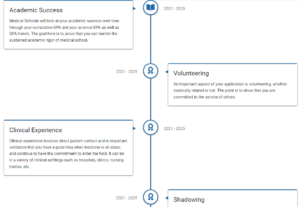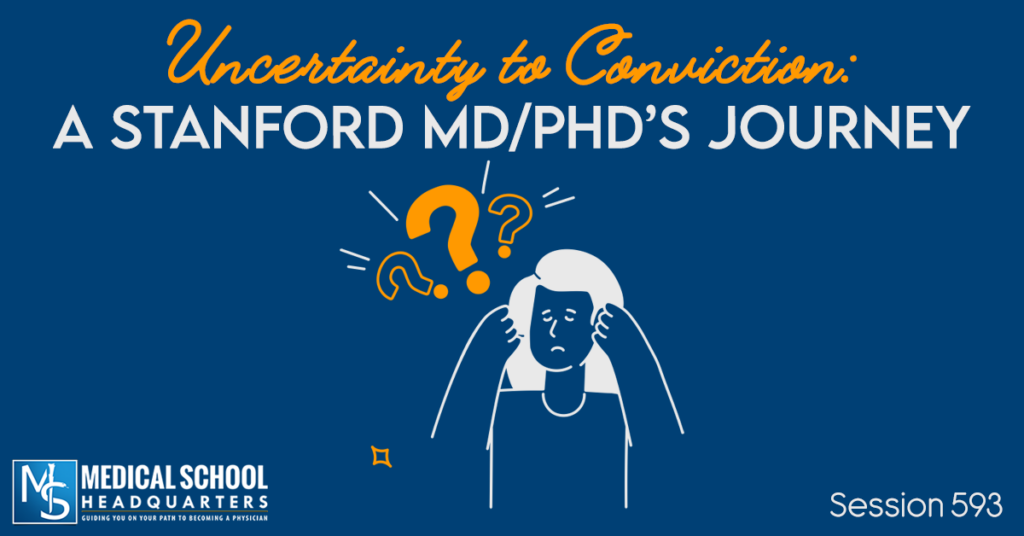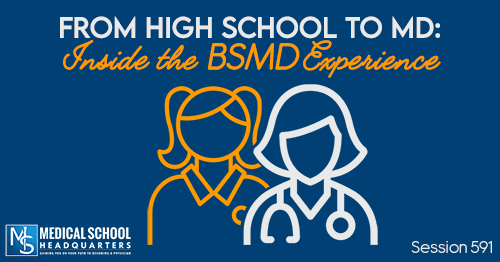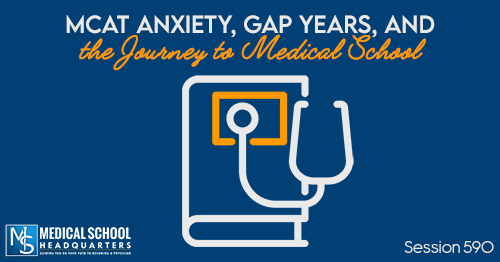Today we will cover the premed timeline from start to finish. This post will try to balance the needs of both traditional and nontraditional students, but everyone is different. You should feel free to customize this path according to your unique needs. The most traditional route is to apply to medical school during the summer between your junior and senior years of college and begin medical school a few months after college graduation. This is not the only path; other paths are becoming more and more common. Any path that ends in you accomplishing your dreams is the right path.
The first step in deciding what your premed journey will look like is deciding what year you want to begin medical school. You will apply roughly a year before your matriculation date. The amount of time between now and when you start medical school will depend on your specific circumstance.
Here are some questions you can ask yourself to determine how much time lies between you and medical school. Do you need to start and finish or nearly finish a bachelor’s degree? Are you a career changer who only needs to take the prerequisite courses? Do you need to work full-time and balance that with studying? Then, you might need to add more time to your journey. Your answers to each of these questions will affect your path and how much time it takes.
To play around more with your specific journey and get specific years attached to these milestones, you can get a Premed Roadmap inside your free Mappd account.

3 to 4 Years Before Medical School
1. Plan to take all the medical school prerequisite classes.
Remember, each medical school will have slightly different prerequisite classes. Review the requirements of any medical schools you are considering. Here are the basic premed requirements that most medical schools require:
- Physics (1 year, with labs)
- General Chemistry (1 year, with labs)
- Organic Chemistry (1 year, with labs)
- Biology (1 year, with labs)
- Biochemistry (1 semester)
- Statistics or Calculus (1 semester)
- English (1 semester)
- Psychology (1 semester)
- Sociology (1 semester)
Some of these might not be required for every school or the particular schools you’re looking at. We recommend fitting all or most of these courses before taking the MCAT. Students sometimes try to take the MCAT before their biochemistry course and find themselves drowning in the amount of biochemistry on the MCAT.
2. Meet with a premed advisor.
When you meet with your premed advisor early on, it’s not necessarily for specific advice but more for the introduction. College advisors “advise” many, many students. So you need to invest time into the relationship so that the advisor gets to know you personally.
To get the most out of your advising meetings, research your question or concern beforehand, so you’re coming to them with a specific problem they can help you solve. You can also give them read-only access to your Mappd account, so they can keep up with everything you’ve been doing between appointments.
If your premed advisor discourages you from applying to medical school solely based on your past academic performance or some other factor, find a new advisor. It’s not your advisor’s job to tell you that you can’t get into medical school. They will never be as invested as you are in your path to becoming a physician, and they don’t know what you are capable of with the proper focus and adjustments to your study habits.
2 to 3 Years Before Medical School
When you first begin this process, focus on becoming a good student. You don’t need to cram every spare minute of your schedule with extracurriculars from the beginning or ever. Find a balance between doing well in your classes and getting experience outside the classroom that works for you.
There’s no set checklist, and you don’t need one of each type of activity to succeed. You can use the list below or our guide on what to focus on besides grades to decide which activities you should pursue. However, these are things that you can do to confirm that medicine is for you and strengthen your application in the process:
- Get clinical experience. This experience will not only strengthen your medical school application and CV, but it may guide you in selecting a specific medical specialty. It may also give you patient experiences to write about on your personal statement, and you could meet a physician or volunteer supervisor who can write you a strong letter of recommendation. Getting clinical experience is one of the most important things you can do as a premed because it’s the best way to know that you want to spend your time taking care of people.
- Shadow physicians. Shadowing is the best way to get a picture of what the life of a physician is really like. If you’re able to shadow the same physician for an extended period, you’ll get a great picture of what their job is like, and you’ll build a strong enough relationship to have them write you a letter of recommendation. It can also be useful to shadow in a variety of specialties for shorter amounts of time. In-person shadowing will give you the most valuable experience, but eShadowing is a great way to get started.
- Do community service. Community service is a great way to get to know your community and give back. We also use the term community service instead of just saying volunteering to encourage students to find opportunities to work with underserved populations in their area. This can also strengthen your application to schools with a mission focused on community service or underserved populations.
- Get involved with research (if you want). Getting involved with research can help build your critical thinking skills (which will come in handy on the MCAT) and your ability to critically evaluate the research of others. You might also consider a research career if you find that you love it. If this is the case, you may want to think about a combined MD/PhD program, although physicians without a PhD can do research, too. Your PI can also serve as a valuable mentor for you and may write you a letter of recommendation in the future.
1 to 2 Years Before Medical School (Getting Ready to Apply)
Fall/Winter
- Meet again with your premed advisor. You should be keeping in contact with your advisor periodically, especially after each semester, to ensure they are receiving evaluations from your professors. These evaluations will help the advisor make better recommendations for you.
- Think about who will write your letters of recommendation. This is a very important step. If your premed office offers a committee letter, find out what’s required to gain a committee letter. If you don’t have access to a committee letter or choose not to go that route, you’ll want to start making a list of who you want to write your letters. Check the websites of medical schools you’re thinking of applying to so you know what they require. Keep in touch with or get back in touch with potential letter writers, so your relationship with them has a strong foundation when it’s time for them to write that letter.
- Register for the MCAT and study. The MCAT can open many doors to medical school. Every year, a lot of students make the mistake of underestimating it or treating it like any other test. Don’t let this be you. Be very prepared for this test.
- Begin drafting your personal statement. We recommend that you begin drafting your personal statement in January of the year you apply. This way, you can fit time spent writing in between study sessions. If you write a few drafts early on, you can spend the time waiting to get your MCAT score polishing up your primary application and prewriting your secondary applications.
[Related episode: Do I Need an MCAT Prep Course? Or Can I Self-Study?]
Spring
-
- Take the MCAT. Usually, I recommend taking the MCAT in March or April for timing reasons. Taking your MCAT early in the year will give you enough time after crushing the MCAT to write and polish your primary application.
- Decide which type of programs you want to apply to: MD, DO, MD/PhD, MD/MPH, or any of the other combinations there may be. For most students, I recommend applying to both MD and DO schools because it gives you more chances to become a physician.
- Create a list of medical schools to apply to. Most students apply to somewhere between 10 and 30 schools. Choose schools based on the location, the class size, the curriculum, and whether it feels like a good fit for you. Don’t focus on stats. Here’s a podcast episode I recorded all about putting together a school list.
- Request letters of recommendation from your professors. Hopefully, you followed the advice for the fall semester and introduced yourself to your professors earlier. Don’t show up to their office and request a letter of recommendation without that professor knowing who you are. And don’t rush the professor for the letter. Plan ahead and give them plenty of time. Use Interfolio to store your letters until it’s time to apply.
- Meet again with your premed advisor. See if your premed advisor can help you get a committee letter and begin gathering the necessary materials for your application.
1 Year Before Medical School (The Application Cycle)
The application services for medical schools open in early May and allow you to submit in early June. The application process is quite expensive, as you’ll be charged primary application fees and secondary application fees. Have some money ready to cover these expenses. Here’s more information about the costs you should expect.
- Complete your primary application, and submit early. Submit your primary application to AMCAS (for most MD schools), AACOMAS (for DO schools), and/or TMDSAS (for Texas schools) in June if possible. Delaying your application puts you at a major disadvantage because of rolling admissions. Even if the school’s website says their application deadline is in November or December, you need to submit as close to June as possible.
- Prewrite and submit your secondary essays. Almost every school you submit a primary application to will automatically send you a secondary application with essay prompts. You should have those secondaries returned within about a two-week window. You can use our Secondary Application Essay Library to prewrite your essays based on prompts from previous years. Then you’ll be ready to submit them quickly as you get them!
After Submitting Your Application
Fall-Spring
- Prepare for the medical school interview. Practice answering common medical school interview questions. Record yourself answering the questions with a tool like our Anytime Mock Interview Platform or invest in 1-on-1 mock interviews with me or someone else who knows what to look for.
- Interview at medical schools that offer you an interview. After the interview, send thank you notes to each and every person you interviewed with. A nice touch would also be sending a thank you letter to the secretary in charge of scheduling your interview. These people keep the process moving!
- Start researching how you will pay for medical school. There are numerous financial aid options, including the Health Professions Scholarship Program through the Military. Do your research and prepare any required forms.
Spring-Summer
- Select the school where you will matriculate. Hopefully, you will have a good list of medical schools to choose from.
- Call the schools you will not go to, and thank them for their offer and time. Do this as soon as you know you won’t be going there. This will help fellow applicants receive a slot.
- Enjoy the rest of college, and celebrate with your classmates at graduation!
Summer Before Medical School
- Pack and Move. Try to live near the medical school for easy logistics. Living with other medical students can be a great idea since you will all be going through this together. Living alone or with someone else who will keep up a quiet, studious lifestyle can also work well.
- Start Medical School! Learn a ton, have fun, and take care of yourself!
Links and Other Resources
- View the AAMC’s recommended medical school application timeline.
- Check out my Premed Playbook series of books (available on Amazon), with installments on the personal statement, the medical school interview, the MCAT, and the entire application process.
- Related episode: When Should I Take the MCAT?
- Need help deciding when to start medical school? Talk with one of our advisors through MappdChat.






